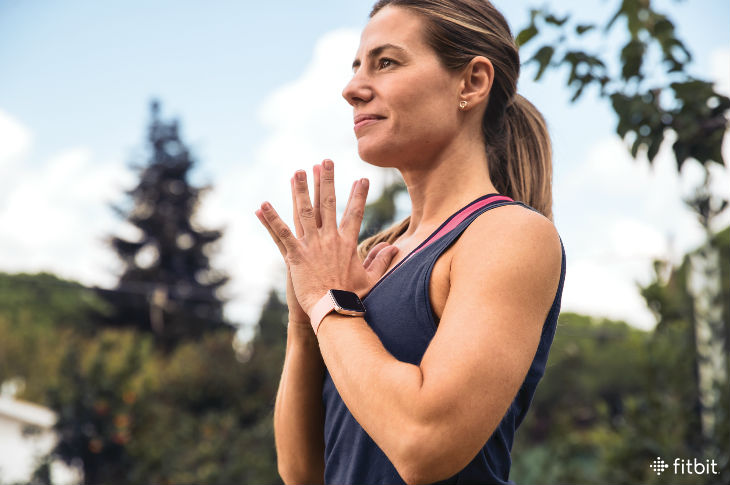When January rolls around, many people are tempted to make big, sweeping changes to their routines. Run 25 miles a week. Hit the gym for an hour every day. Follow a 100% plant-based diet. Those major lifestyle changes definitely work for some. But if you’re like most people, trying to change your entire routine (and trying to change it all at once) can feel overwhelming—and can quickly lead to burnout.
Luckily, you don’t need to completely overhaul your routine in order to see serious progress. Making small changes can drive big results for your diet and exercise routine—not to mention your health, happiness, and overall well-being. But what, exactly, are those changes?
Take advantage of opportunities to move
An intense sweat sesh is great, but any opportunity you have to move throughout the day can help you move the needle on your health and fitness goals.
Look for small ways to incorporate more movement throughout the day, because all those “small” opportunities to get up and go? They add up—in a big way. “Park further away at the store, take the stairs, pace around the office when you are on a call,” says Ali Greenman, NASM Certified Personal Trainer and founder of Final Straw Fitness. “Every bit of movement counts and will add to your overall caloric deficit.”
Change your environment, change your habits
Obviously, making changes to your diet and exercise routine will help drive results. But what’s maybe not so obvious? Making changes to your environment can be just as effective.
“Most people try to use willpower and discipline when it comes to making changes to their food and health routines—but switching up things in your environment [is a small change that] can help immensely,” says Clinical Exercise Physiologist and health coach Jennifer Powter.
Want to start eating more whole foods? Keep your fruit and veggies in a bowl on the counter so you see them every time you walk into the kitchen—and clean out your pantry of any processed foods you’re trying to avoid. Want to get motivated to run every morning? Lay out your workout gear and running shoes the night before, so all you have to do is grab them and go.
The point is, your environment influences your behavior. So, by making small changes to your environment, you can set yourself up for success in hitting your healthy eating and exercise goals—and drive serious results.
Schedule stretch breaks
Too much sitting is seriously bad for your health. And it’s also bad for your energy levels. Sitting at your desk for four, five, or eight hours at a time can leave you feeling tired, drained, and unmotivated—which can make it harder to follow through with your diet and fitness goals.
Luckily, there’s a simple solution to kick that tired feeling to the curb—and that’s breaking up your sitting time with movement time. “Start to incorporate a two-minute ‘get up from your desk’ moment for every hour at work,” says fitness trainer and former Olympic athlete Samantha Clayton. “Just a simple walk, stretch or a few squats will work wonders to improve your energy levels.”
You can even use your Fitbit device as a reminder. It’ll tell you how many steps you have remaining to reach 250 steps each hour, on the hour. Why not take a little stroll around the office while you’re at it?
Have a bedtime routine
A huge percentage of people don’t get a good night’s sleep on a regular basis—which can wreak havoc on your body’s ability to function. “The stress hormone hormone—cortisol—is directly impacted by sleep and holds the key to mental health, weight loss or gain, sex drive, memory, energy levels, appetite and more,” says Angel V. Shannon, MS, CRNP, and founder of Sēva Health.
But there’s one small change that can have a big impact on your sleep—which, in turn, can make a big impact your overall health. Create a consistent bedtime routine.
When you do the same routine before bed each night (for example, taking a hot bath, having a cup of tea, climbing into bed with a good book, or all of the above), eventually, your brain will start to associate that routine with winding down, which will make it easier to fall and stay asleep. Just make sure the activities you include in your bedtime routine help you wind down (instead of winding you up).
“While some people enjoy watching TV…or catching up on their social media at night, the truth is, those activities often activate the sympathetic nervous system—that part of the brain that tells the body it’s time to get to work,” says Shannon. “Heavy exercise, social media, texting, and any other activity that engages the brain or body into action rather than relaxation should be avoided.”
This information is for educational purposes only and is not intended as a substitute for medical diagnosis or treatment. You should not use this information to diagnose or treat a health problem or condition. Always check with your doctor before changing your diet, altering your sleep habits, taking supplements, or starting a new fitness routine.


If you have questions about a Fitbit tracker, product availability, or the status of your order, contact our Support Team or search the Fitbit Community for answers.
Please note: Comments are moderated and may not appear immediately after submission.